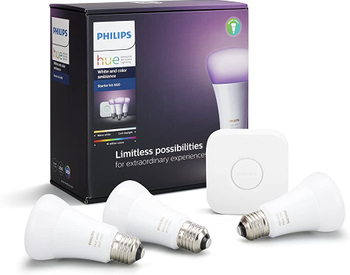 |
| |||||
                  | ||||||
 |
| |||||
                  | ||||||
Smart home technology - it's supposed to make our lives easier, right? But does it really?
As someone who loves technology, you can bet I was excited to set up a bunch of smart home products to make my life easier and to make my place cooler, and yeah, I have spent a lot of money on light bulbs, smart plugs, heck, even my A/C unit is connected to Google Home.
Yes, there have been moments that I was like "Wow, that's so cool!", and this is what I came to realize over the last couple of years:
For starters, commercial products are provided by different companies with little to no integration. This means that if you want to have a smart home setup, you'll likely need to use products from multiple companies, which have different APIs.
Sure you can integrate most of them together, but because of the lack of a common standard in the industry, that setup will be time consuming and frustrating.
But even when you manage to get everything set up, there are still plenty of problems to deal with. Most companies only make money on the physical product and have no incentive to keep their cloud service running well, so you might end up with a buggy, slow, or find yourself with a brick because the company decided to shut down their cloud service.
The biggest example for me is the Logitech Harmony, I got the Harmony Elite a couple of years ago for $500 AUD. It's super expensive and hardware-wise it felt like a premium product.

And there were some cool features, like the Remote with a touch screen that you can use to activate the "activities" and the fact that it could remember the state your device was in so you could change it to another state without it getting lost (provided you didn't change anything with your device's actual remote control).
But as you may have heard by now, Logitech discontinued the Harmony products and you can be sure the servers will be gone very soon as they are not making any money out of it anymore.
But that's not even the worst part, I actually had stopped using my Elite about a year ago because it's slow and buggy, especially the mobile app. Oh my god, that Android app was awful. Setting up an activity or a custom device took forever, it loved resyncing with the service at every single step.
But again, I don't fully trust them because they only make money on the devices and it wouldn't take much for them to give up on the whole line of products at some point.
Some companies have subscription models, which means you'll need to pay for an expensive piece of hardware and then also pay for a subscription to a service. Sure, that would probably solve the reliability issue and make the service live longer, but the cost can add up quickly if you have multiple smart home providers.
The lack of industry-wide standards also has a nasty side-effect of, if the company decides to change their API, which is pretty much guaranteed to happen, things will stop working out of nowhere and you'll have to set up their devices all over again!
There are open source, self-hosted options like Home Assistant that are reliable and work well and the developers did a great job at integrating as many providers as possible, but they require a lot more time investment to set up than commercial products. If you have the time and patience to set it up, you can get it working reliably, but I don't want smart home tech to become my main hobby, and there's still the issue where you'll be integrating 3rd party smart devices to it and they will invariably stop working and you'll have to set them up again.
Then there are the personal assistants, using stuff like Alexa or Google Assistant can be fun, but most of the time it's just quicker to physically switch the light on and off because the personal assistants don't always pick up on commands correctly and there's a huge cloud roundtrip of requests being sent to Google or Amazon, then Google and Amazon sending requests to the smart home provider, and then the smart home provider sending a request back to control the device making reactivity after a command super slow.

Not to mention having devices from those two companies that, honestly, aren't exactly the most trustworthy handling stuff inside of your house.
Smart switches can be a solution, but a lot of them are battery-operated, which means you'll need to constantly change batteries if you have a lot of them, and you can bet that my ADHD ridden ass will forget to do and just go to the path of least resistance, using the normal light switch.
There are ones that replace normal light switches and connect to your house's wiring, they are interesting because you can both use the personal assistants, their apps or their physical buttons without things getting out of sync. That's good but now you have a wifi device in your wall that depends on a wifi router that is not permanently attached to the house, which feels weird.
You also have now those companies untrustworthiness inside of your wall and finally, if unlike me you don't have the confidence to install them yourself, you will need an electrician to do that. (Which is the recommended thing to do anyway, do it as I say not as I do).
And let's not forget that all of this is all a very expensive endeavour for little to no time gains or life improvements.
The state of smart home technology is frustrating, time-consuming, and expensive. Although open-source options work well, they require a lot more time investment. And even when everything is set up, there's no guarantee that the services will continue to work well.
Yeah, I'm still using a lot of my smart-bulbs and smart plugs, but that's mainly because of the sunk cost fallacy. I have spent the money, so I might as well use that crap.
I usually use smart plugs with their timer features to turn stuff on and off at specific times and there are products that are better than others:

When it comes to reliabilty and ease of use I feel Philips Hue is generally pretty good despite being extremly overpriced, still having the battery operated switches and the slow response when using personal assistants. But you can usually reduce the cost by connecting Ikea Tradfri devices to it with little extra effort.Philip
With all of that, I really hope that things improve in the future because the idea of having a bunch of smart devices with automations at home still sounds cool, but I honestly don't see the situation improving a lot especially given of how the market incentives work.
Anyways, this is my opinion over my experience with these technologies, I'd love to hear about your experience in the comments below, good or bad!
Thanks!


